|
The Chicago Transit Authority - "The Chicago Transit Authority" (CBS 1969)
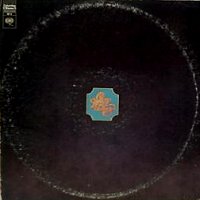 The combination of energetic rock, jazz and catchy pop made Chicago the best and most successful of the many brass rock bands which were extremely popular in the '70s. They became one of the utterly few bands to make their debut a double album, and they were still named The Chicago Transit Authority at the time of the release. The opener "Introduction" was penned by guitarist Terry Kath, and a more fitting and better introduction to the band's sound and style could probably not have been written. The horn-section of James Pankow, Lee Loughnane and Walter Parazaider swings like hell upon the foundation laid by bassist Peter Cetera, drummer Danny Seraphine, keyboardist Robert Lamm and Kath. The instrumental part of the song is long and complex, dominated mainly by the horns but features also a guitar solo from Kath. Even the lighter and more pop-oriented songs, such as "Does Anybody Really Know What Time It Is" and "Questions 67 and 68", are turned into truly sophisticated pieces of work by the group's rich and colourful arrangements. The bluesy and jam-oriented hard rock of "Poem 58" and not at least the nearly 7 minutes of feedback and noise in "Free Form Guitar" are mostly pure showcases for Kath, while "Listen" is a shorter and more modest rocker, but with an almost disharmonic horn-part in the middle. The more polished "Beginnings" features the best harmonies on the album. By the way, the vocals were usually shared between Kath, Cetera and Lamm. And speaking of Lamm, his juicy organ lays a solid and muscular foundation together with Kath's riff for the gutsy and bluesy rock of "South California Purple", but his keyboards rarely took the solo spot in Chicago's music. The version of Spencer Davis Group's "I'm A Man" is energetic and inspired, featuring an intense percussion-part toward the end. The most overlooked song is however "Someday (August 29, 1968)" that has one of the best melodies on the whole album and also shows the band's political consciousness. The record closes on a big note with the 15-minute jam "Liberation", showing the whole band at their instrumentally best and most energetic. "The Chicago Transit Authority" is a classic and remains the best debut from an American band in 1969. The combination of energetic rock, jazz and catchy pop made Chicago the best and most successful of the many brass rock bands which were extremely popular in the '70s. They became one of the utterly few bands to make their debut a double album, and they were still named The Chicago Transit Authority at the time of the release. The opener "Introduction" was penned by guitarist Terry Kath, and a more fitting and better introduction to the band's sound and style could probably not have been written. The horn-section of James Pankow, Lee Loughnane and Walter Parazaider swings like hell upon the foundation laid by bassist Peter Cetera, drummer Danny Seraphine, keyboardist Robert Lamm and Kath. The instrumental part of the song is long and complex, dominated mainly by the horns but features also a guitar solo from Kath. Even the lighter and more pop-oriented songs, such as "Does Anybody Really Know What Time It Is" and "Questions 67 and 68", are turned into truly sophisticated pieces of work by the group's rich and colourful arrangements. The bluesy and jam-oriented hard rock of "Poem 58" and not at least the nearly 7 minutes of feedback and noise in "Free Form Guitar" are mostly pure showcases for Kath, while "Listen" is a shorter and more modest rocker, but with an almost disharmonic horn-part in the middle. The more polished "Beginnings" features the best harmonies on the album. By the way, the vocals were usually shared between Kath, Cetera and Lamm. And speaking of Lamm, his juicy organ lays a solid and muscular foundation together with Kath's riff for the gutsy and bluesy rock of "South California Purple", but his keyboards rarely took the solo spot in Chicago's music. The version of Spencer Davis Group's "I'm A Man" is energetic and inspired, featuring an intense percussion-part toward the end. The most overlooked song is however "Someday (August 29, 1968)" that has one of the best melodies on the whole album and also shows the band's political consciousness. The record closes on a big note with the 15-minute jam "Liberation", showing the whole band at their instrumentally best and most energetic. "The Chicago Transit Authority" is a classic and remains the best debut from an American band in 1969.
Chicago - "Chicago" (CBS 1970)
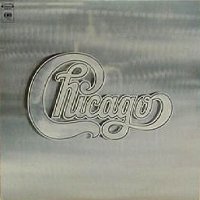 The band had to shorten their name to just Chicago for legal reasons after the debut. Their first record under the new name was surprisingly enough yet another double album. Musically "Chicago" was even more ambitious than the debut, as many of the songs were tied together into lengthy multi-part suites. "Ballet for a Girl in Buchannon" was composed entirely by Pankow, and featured two of the best-known tunes from the album with the catchy "Make Me Smile" and the beautiful "Colour My World". In between these songs were also short but complex instrumentals like "Anxiety's Moment", "West Virginia Fantasies" and "To be Free". All these elements made the suite one of the most impressive and progressive moments in Chicago's catalogue. But the most recognized song from the album is probably Lamm's harder rocking "25 or 6 to 4". This track included one of the few guitar solos on the record, as Kath's guitar work had been toned down a bit compared to the debut. This gave even more room for the horn-section to dominate the sound. Lamm also delivered songs like the bright and cheerful "Fancy Colours" and the complex but overlooked "Poem for the People". Among Terry Kath's songs we find the excellent "The Road" and the soulful "In the Country". The band even went into fully orchestrated classical music in a trio of short instrumentals that ended with Kath's ballad "Memories of Love". The four-part suite "It Better End Soon" was another impressive piece composed mostly by Lamm, and featured a lengthy flute solo from Parazaider among all the groovy horn-riffs and intense jamming. The record closed in a more structured and laidback way with Cetera's melodic "Where Do We Go from Here". "Chicago" is one of the band's greatest artistic achievements, and will be a great place to start with Chicago. The band had to shorten their name to just Chicago for legal reasons after the debut. Their first record under the new name was surprisingly enough yet another double album. Musically "Chicago" was even more ambitious than the debut, as many of the songs were tied together into lengthy multi-part suites. "Ballet for a Girl in Buchannon" was composed entirely by Pankow, and featured two of the best-known tunes from the album with the catchy "Make Me Smile" and the beautiful "Colour My World". In between these songs were also short but complex instrumentals like "Anxiety's Moment", "West Virginia Fantasies" and "To be Free". All these elements made the suite one of the most impressive and progressive moments in Chicago's catalogue. But the most recognized song from the album is probably Lamm's harder rocking "25 or 6 to 4". This track included one of the few guitar solos on the record, as Kath's guitar work had been toned down a bit compared to the debut. This gave even more room for the horn-section to dominate the sound. Lamm also delivered songs like the bright and cheerful "Fancy Colours" and the complex but overlooked "Poem for the People". Among Terry Kath's songs we find the excellent "The Road" and the soulful "In the Country". The band even went into fully orchestrated classical music in a trio of short instrumentals that ended with Kath's ballad "Memories of Love". The four-part suite "It Better End Soon" was another impressive piece composed mostly by Lamm, and featured a lengthy flute solo from Parazaider among all the groovy horn-riffs and intense jamming. The record closed in a more structured and laidback way with Cetera's melodic "Where Do We Go from Here". "Chicago" is one of the band's greatest artistic achievements, and will be a great place to start with Chicago.
Chicago - "Chicago III" (CBS 1971)
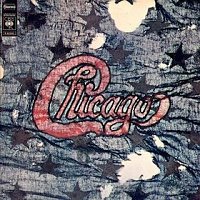 Chicago's third LP was, believe it or not, also a double album. The funky and lengthy opener "Sing A Mean Tune Kid" brought Kath's gutsy guitar-work back into the spotlight again after its more restricted role on the second album. Lamm delivered some delicious organ on his own "Loneliness is Just a Word" while Cetera's country-inflected pop of "What Else Can I Say" was a bit of the more lightweight kind. The heavy blues-rock of "I Don't Want Your Money" reminds me a bit of very early Jethro Tull of all things. The first extended multi-part suite on the album was Lamm's "Travel Suite". It opens with "Flight 602"; a whimsical tune about homesickness that goes into the drum-solo "Motorboat to Mars" that fortunately only lasts for about one and a half minute. The energetic and catchy "Free" is the best-known moment from the suite, and glides into the improvised instrumental "Free Country" that consists mostly of vibes, flute and piano. This is followed by yet another strongly melodic song in "At the Sunrise" before the suite closes with the lengthy jam of "Happy 'Cause I'm Going Home" that features lots of wordless vocals followed by long flute-solos from Parazaider. Lamm delivered quite a lot of goodies as usual, as he also wrote the excellent "Mother" dominated by his rhythmic el-piano, a memorable chorus and more upbeat horn-passages in the middle. Both Cetera and drummer Seraphine wrote the catchy "Lowdown", and this song had the most obvious hit-potential on the album (although "Chicago III" failed to deliver any new hit-songs for the band). Kath's most noticeable contribution to the album is "An Hour in the Shower" that also was divided into several subsections like a suite, although it's a fairly straightforward five-minute song. But Pankow's 15-minute instrumental suite "Elegy" will impress even some progressive rock fans. It starts with the narrated poem "When All the Laughter Dies in Sorrow" before it goes into the fanfare of "Canon" that glides graciously into the beautiful flute-theme of "Once Upon a Time". The contrast is tremendous to the disharmonic cacophony of "Progress?" that explodes into the energetic "The Approaching Storm" that is packed to the rim with great horn-riffs and extended solos from most members of the band. Most noticeable is Lamm's distorted organ-solo toward the end. The suite then climaxes with the grandiose and dramatic "Man vs. Man: The End" that makes a fitting finale to yet another one of Chicago's best albums. Rick van der Linden from Ekseption rated in 1973 "Chicago III" as one of his ten favourite albums of all time. Chicago's third LP was, believe it or not, also a double album. The funky and lengthy opener "Sing A Mean Tune Kid" brought Kath's gutsy guitar-work back into the spotlight again after its more restricted role on the second album. Lamm delivered some delicious organ on his own "Loneliness is Just a Word" while Cetera's country-inflected pop of "What Else Can I Say" was a bit of the more lightweight kind. The heavy blues-rock of "I Don't Want Your Money" reminds me a bit of very early Jethro Tull of all things. The first extended multi-part suite on the album was Lamm's "Travel Suite". It opens with "Flight 602"; a whimsical tune about homesickness that goes into the drum-solo "Motorboat to Mars" that fortunately only lasts for about one and a half minute. The energetic and catchy "Free" is the best-known moment from the suite, and glides into the improvised instrumental "Free Country" that consists mostly of vibes, flute and piano. This is followed by yet another strongly melodic song in "At the Sunrise" before the suite closes with the lengthy jam of "Happy 'Cause I'm Going Home" that features lots of wordless vocals followed by long flute-solos from Parazaider. Lamm delivered quite a lot of goodies as usual, as he also wrote the excellent "Mother" dominated by his rhythmic el-piano, a memorable chorus and more upbeat horn-passages in the middle. Both Cetera and drummer Seraphine wrote the catchy "Lowdown", and this song had the most obvious hit-potential on the album (although "Chicago III" failed to deliver any new hit-songs for the band). Kath's most noticeable contribution to the album is "An Hour in the Shower" that also was divided into several subsections like a suite, although it's a fairly straightforward five-minute song. But Pankow's 15-minute instrumental suite "Elegy" will impress even some progressive rock fans. It starts with the narrated poem "When All the Laughter Dies in Sorrow" before it goes into the fanfare of "Canon" that glides graciously into the beautiful flute-theme of "Once Upon a Time". The contrast is tremendous to the disharmonic cacophony of "Progress?" that explodes into the energetic "The Approaching Storm" that is packed to the rim with great horn-riffs and extended solos from most members of the band. Most noticeable is Lamm's distorted organ-solo toward the end. The suite then climaxes with the grandiose and dramatic "Man vs. Man: The End" that makes a fitting finale to yet another one of Chicago's best albums. Rick van der Linden from Ekseption rated in 1973 "Chicago III" as one of his ten favourite albums of all time.
Chicago - "At Carnegie Hall" (CBS 1971)
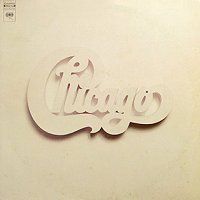 Modesty was obviously an unknown term for Chicago, as they followed up three double albums in a row with this massive four-LP live album recorded during their sold-out week at New York's famous Carnegie Hall in April 1971. It came complete with a thick book full of large photos of the band on stage at Carnegie Hall and posters so big that you could use them as wallpaper. The record opens with the sounds of the band warming up and tuning instruments before they stumble into "In the Country" where Lamm's organ has a stronger presence than in the studio. "Fancy Colours" is spirited and joyful, and the piano-intro to "Does Anybody Really Know What Time It Is?" has been extended with six minutes. But the 15-minute version of "South California Purples" is where things really catch fire. Here the band shows that they could jam and rock live just as good and hard as any other group from the same era. The same goes for the 13 minutes of "Sing A Mean Tune Kid", and the harmonies of "Beginnings" had been recreated quite well. "It Better End Soon" takes up the whole of side four, and Parazaider improvises and toys with lots of well known themes in his flute-solo. "Introduction" is played slightly faster but otherwise identical to the studio-version. The more pop-oriented tracks, such as "Questions 67 and 68", "Lowdown" and "Where Do We Go From Here?" are naturally also rather faithful to the studio-versions. "Happy 'Cause I'm Going Home" and a hyper-energetic "Free" are the highlights of the extracts from "Travel Suite". "Mother" is almost twice as long as the original version, and it's not surprisingly the horn-solos in the middle that has been extended. "Ballet for a Girl in Buchannon" is performed solid and well, although nothing new or unexpected has been added to the tracks in the suite. The eight and last side of the record opens with a track called "A Song for Richard and His Friends" that never appeared on any of their studio albums. It's a really good and powerful tune with a very progressive melody on the beginning and end, while the mid-part is a groovy and swinging song. The lyrics were an attack on Richard Nixon and his fellow conspirators, and the song is introduced as "a wishful thought that President Nixon will quit". As we all know, this wish came true three years later. "25 or 6 to 4" is unfortunately disappointing as this song should have been a killer live, but sounds a bit uninspired here. The band makes partly up for it with an energetic "I'm a Man" that closes the album in an intense and satisfying way. "At Carnegie Hall" is a solid document of Chicago live from the undoubtedly best and most interesting phase of their career. Modesty was obviously an unknown term for Chicago, as they followed up three double albums in a row with this massive four-LP live album recorded during their sold-out week at New York's famous Carnegie Hall in April 1971. It came complete with a thick book full of large photos of the band on stage at Carnegie Hall and posters so big that you could use them as wallpaper. The record opens with the sounds of the band warming up and tuning instruments before they stumble into "In the Country" where Lamm's organ has a stronger presence than in the studio. "Fancy Colours" is spirited and joyful, and the piano-intro to "Does Anybody Really Know What Time It Is?" has been extended with six minutes. But the 15-minute version of "South California Purples" is where things really catch fire. Here the band shows that they could jam and rock live just as good and hard as any other group from the same era. The same goes for the 13 minutes of "Sing A Mean Tune Kid", and the harmonies of "Beginnings" had been recreated quite well. "It Better End Soon" takes up the whole of side four, and Parazaider improvises and toys with lots of well known themes in his flute-solo. "Introduction" is played slightly faster but otherwise identical to the studio-version. The more pop-oriented tracks, such as "Questions 67 and 68", "Lowdown" and "Where Do We Go From Here?" are naturally also rather faithful to the studio-versions. "Happy 'Cause I'm Going Home" and a hyper-energetic "Free" are the highlights of the extracts from "Travel Suite". "Mother" is almost twice as long as the original version, and it's not surprisingly the horn-solos in the middle that has been extended. "Ballet for a Girl in Buchannon" is performed solid and well, although nothing new or unexpected has been added to the tracks in the suite. The eight and last side of the record opens with a track called "A Song for Richard and His Friends" that never appeared on any of their studio albums. It's a really good and powerful tune with a very progressive melody on the beginning and end, while the mid-part is a groovy and swinging song. The lyrics were an attack on Richard Nixon and his fellow conspirators, and the song is introduced as "a wishful thought that President Nixon will quit". As we all know, this wish came true three years later. "25 or 6 to 4" is unfortunately disappointing as this song should have been a killer live, but sounds a bit uninspired here. The band makes partly up for it with an energetic "I'm a Man" that closes the album in an intense and satisfying way. "At Carnegie Hall" is a solid document of Chicago live from the undoubtedly best and most interesting phase of their career.
Chicago - "Chicago V" (CBS 1972)
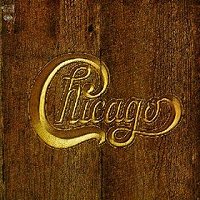 Chicago's fifth album was their first single one, and proved that the band after all also was able to make good music even within a more limited frame of time. It signalled a slight turn toward more song-oriented material with less instrumental dominance, but the energy and sheer musical quality of the previous albums was still there. Most of the record was composed by Lamm, with the exception of Pankow's "Now That You've Gone" (featuring one of their best and tightest horn-arrangements ever) and Kath's "Alma Mater". The two-part "Dialogue" was sung by all three singers in the band, and was next to "Saturday in the Park" catchy enough to be the hit and best-known song from the album. "While the City Sleeps" and "State of the Union" are both powerful mid-tempo rockers, and made a contrast to the smooth harmonies of "All Is Well" and Kath's earlier mentioned "Alma Mater". A weak chorus unfortunately drags down the latter one. The jazzy opener "A Hit by Varèse" sounds like progressive rock with horns, and that's not a bad thing at all! "Goodbye" is perhaps the song on the album that has most in common with the earlier albums, but remains more of the same all the way through, despite its many lengthy solos and instrumental parts. "Chicago V" showed that the band's formula still worked well, and the result was yet another commercially and artistically successful record. But Chicago had now in only three years released more music than what many bands do during their entire career. Such an extreme amount of productivity would sooner or later take its toll on the quality of the band's output, and time would show that the band now pretty much were emptied creatively. Later in the '70s they became an uninteresting, ultra-slick and plain bad pop group hopelessly obsessed with crappy hit-ballads, and this tendency only grew worse after Terry Kath's death in 1978. You can safely stop after "Chicago V" if you want only the very best of the band. Chicago's fifth album was their first single one, and proved that the band after all also was able to make good music even within a more limited frame of time. It signalled a slight turn toward more song-oriented material with less instrumental dominance, but the energy and sheer musical quality of the previous albums was still there. Most of the record was composed by Lamm, with the exception of Pankow's "Now That You've Gone" (featuring one of their best and tightest horn-arrangements ever) and Kath's "Alma Mater". The two-part "Dialogue" was sung by all three singers in the band, and was next to "Saturday in the Park" catchy enough to be the hit and best-known song from the album. "While the City Sleeps" and "State of the Union" are both powerful mid-tempo rockers, and made a contrast to the smooth harmonies of "All Is Well" and Kath's earlier mentioned "Alma Mater". A weak chorus unfortunately drags down the latter one. The jazzy opener "A Hit by Varèse" sounds like progressive rock with horns, and that's not a bad thing at all! "Goodbye" is perhaps the song on the album that has most in common with the earlier albums, but remains more of the same all the way through, despite its many lengthy solos and instrumental parts. "Chicago V" showed that the band's formula still worked well, and the result was yet another commercially and artistically successful record. But Chicago had now in only three years released more music than what many bands do during their entire career. Such an extreme amount of productivity would sooner or later take its toll on the quality of the band's output, and time would show that the band now pretty much were emptied creatively. Later in the '70s they became an uninteresting, ultra-slick and plain bad pop group hopelessly obsessed with crappy hit-ballads, and this tendency only grew worse after Terry Kath's death in 1978. You can safely stop after "Chicago V" if you want only the very best of the band.

|